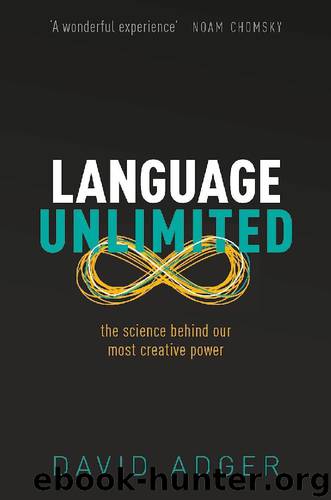Language Unlimited by David Adger

Author:David Adger [Adger, David]
Language: eng
Format: epub
ISBN: 9780192563194
Publisher: OUP Oxford
Published: 2019-08-29T04:00:00+00:00
This bias towards using discrete categories holds not just of sounds, but also for other aspects of linguistic structure. Adult speakers of languages easily recognize distinct words, carving them out of the continuous stream of speech. Because of this, if you take a sentence and mix up the words with each other, you can still distinguish them. This is pretty obvious when the words are written down, because in English the tradition is to write spaces between words. But not all languages do this. Putting spaces between words is a fairly late invention in writing systems that use the Latin alphabet; early examples of alphabetic writing divided words using various dots (called interpuncts), or justranallthewordstogetherjustlikethis. As you can see, it’s quite possible to separate out the words in a continuous sequence of letters like this, though it’s a bit of an effort when you are not used to it.
If you mix up bits of words with each other, however, it becomes much more difficult to work out what is going on. Compare the following three cases, where the first is a sentence of English; an unusual sentence, but a sentence nonetheless. I’ve removed all the spaces, but it’s fairly easy to distinguish the words:
Tinyelephantssnortchampagnewiththeirtrunks
In the second example, we have the same words, though I’ve rearranged them so they no longer form a sentence. Again, it’s not too hard to pick out the different words:
Tinysnorttrunkswithelephantschampagnetheir
But in the next, and last example, I’ve rearranged bits of words, rather than whole words. Suddenly it reads as a complete mess:
Tiantselephpagnesnonkschamnywirtthethtruir
Although I’ve presented these examples in written form, you can easily imagine that you’d find the same effects if you’d heard them rather than read them. The reason that the third example is so hard is because words, as discrete units, are crucial to how we store information or knowledge about the languages we speak.
How do we end up with knowledge of these basic units? When children are born, they don’t know the words of their language. However, as they develop, children pick up tens of thousands of words. Researchers who have studied this process report that adults in literate Western societies usually end up with about 60,000 words. If you do the maths, this suggests that children are learning about ten words a day. Part of that learning has to be about pulling out the discrete words from the continuous streams of speech surrounding the child, but there’s a lot more than just that. The child has to understand that different pronunciations of the same word by the same or different people are really, somehow, the same word. They also have to end up with some sense of the meaning of the word, what grammatical patterns it fits into, and all sorts of other things.
Let’s first focus on the most basic part of this: how do children figure out, from the continuous stream of sounds they hear, which parts of that stream correspond to discrete words. The ability of young children to do this is quite remarkable.
Download
This site does not store any files on its server. We only index and link to content provided by other sites. Please contact the content providers to delete copyright contents if any and email us, we'll remove relevant links or contents immediately.
The Art of Thinking Clearly by Rolf Dobelli(10472)
Mindhunter: Inside the FBI's Elite Serial Crime Unit by John E. Douglas & Mark Olshaker(9332)
Change Your Questions, Change Your Life by Marilee Adams(7771)
Nudge - Improving Decisions about Health, Wealth, and Happiness by Thaler Sunstein(7698)
Mastermind: How to Think Like Sherlock Holmes by Maria Konnikova(7334)
The Power of Now: A Guide to Spiritual Enlightenment by Eckhart Tolle(5768)
Men In Love by Nancy Friday(5237)
Altered Sensations by David Pantalony(5097)
Factfulness: Ten Reasons We're Wrong About the World – and Why Things Are Better Than You Think by Hans Rosling(4738)
The Confidence Code by Katty Kay(4252)
Thinking in Bets by Annie Duke(4221)
Man and His Symbols by Carl Gustav Jung(4134)
The Worm at the Core by Sheldon Solomon(3486)
Why Buddhism is True by Robert Wright(3449)
Liar's Poker by Michael Lewis(3445)
Three Women by Lisa Taddeo(3430)
The Inner Life of Animals by Peter Wohlleben(3316)
Descartes' Error by Antonio Damasio(3275)
How Music Works by David Byrne(3264)
